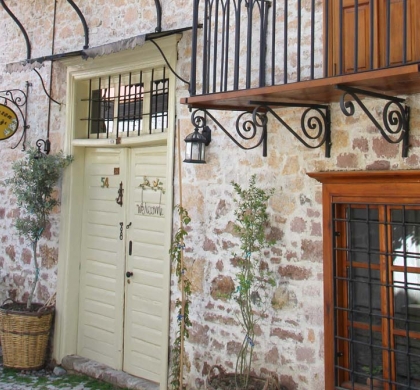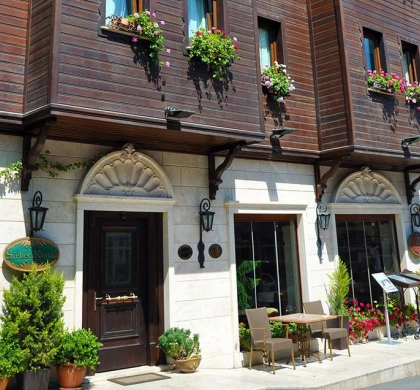Buy or gift a stand-alone digital subscription and get unlimited access to dozens of back issues for just £18.99 / $18.99 a year.
Please register at www.exacteditions.com/digital/cornucopia with your subscriber account number or contact subscriptions@cornucopia.net
Buy a digital subscription Go to the Digital EditionThis silver goblet was one of more than 600 medieval treasures from Central Asia crowding Bonhams’ elegant rooms in Edinburgh for six days in January. The exhibition Art from the Land of Timur is a first glimpse of a huge private collection hidden who knows where in Scotland. The otherwise austere vessel has Kufic script, inscribed in black niello and divided by floral palmettes, reading: “Khagan Most Illustrious, Lord Victorious Triumphant, Buttress of the State and Righteousness of the Religious Community, Togrul Karakhan, Friend of the Amir of True Believers”.
The goblet, 14cm high, was reportedly found in the Issyk Kul basin in modern Kyrgystan. The Karakhanid dynasty had capitals in Kashgar and Samarkand and ruled over a confereration of Turkic tribes controlling a vast area of Centra Asia from the 9th to the early 13th century.
Coins from Togrul Karakhan’s reign allow the goblet to be dated to 1059–74, when niello was first used to decorate Central Asian silverware. The bowl was clearly a treasured possession, worth 200 dirhams by weight alone. It is the sole example of later-11th-century Karakhanid metalwork to be inscribed with the owner’s name.
Balaklava, Sevastopol, Inkerman, the Valley of Death – in Britain, where the savage toll was so acutely felt, these names still have the power to arouse pride and fury. Algernon Percy travelled to Crimea to visit the evocative battlefields
From the Danube to the Caucasus, conflict raged. The Ottomans were fighting for their territories and their lives, but the full story of their courage is only now being told, says the military historian Mesut Uyar
The war of 1853–56 was a calamitous clash of imperial ambitions. Turkey sustained heavy losses, but without them she might have ceased to exist. David Barchard puts the conflict in context
With its healing brine baths and golden beaches, its wealth and variety of architecture, and its layers-deep history, this resort offers something for everyone – from hedonist to hypochondriac
Yevpatoria in Crimea was the home the young Anna Akhmatova, an icon of Russian literature, who fell foul of Stalin
Like many writers, Chekhov made his way to Crimea to nurse his TB in a milder climate. His two houses, now museums, became magnets for artists. One he left to his sister, the other to his wife.
By any standard, Hüsamettin Koçan’s mountain-top Baksı Museum, in the northeastern Anatolian village where he was born, deserves a place among the world’s top ten remote museums.
Philip Mansel on the future Edward VII’s Ottoman expedition
Mulberries come in an array of hues: black, white, pink, purple; some enticingly sweet, others astringent and healing. As Berrin Torolsan can testify, having grown up with them in her Istanbul garden, all are adored – by man, mallard and pine marten alike. Here she traces the history of this lucious fruit
Thomas Whittemore, the American scholar and philanthropist, was instrumental in restoring the Byzantine treasures of Ayasofya. Robert S Nelson delves into his enigmatic life
The V&A’s Tim Stanley eyes up the Louvre’s astonishing new Islamic offering
From the towers of Tatary to the tombs of Scythian kings, from clifftop citadels to an underground castle, from Balaklava to the beaches of the Tsarist Riviera, Crimea is a land to fall in love with, waiting to be enjoyed, not destroyed
As the Sadberk Hanım Museum celebrates the art of embroidery, Min Hogg marvels at the motifs of palaces, fruit and flowers, sea and cityscape, wrought stitch by stitch, to adorn every Ottoman home
Aard Streefland tells the story of the Dutch orientalist Marius Bauer (1867–1932)
The Crimean khans founded their capital in the fertile foothills of the Crimean Mountains in the 15th century. This was the nucleaus of the land known as Cim Tartary. The garden palace of Bahçesaray is a glorious reminder of the khans’ 350-year reign
Dramatic and picturesque, Crimea’s southern coast became a resort for doomed royalty and a refuge for ailing literati
Two ports – Sevastopol and Yevpatoria – rule Crimea’s flat west coast. One was built for war, the other for recreation. Both played a part in the Crimean War
Geonese merchants, a millionaire painter and a symbolist poet brought fortune and fame to the eastern stretches of Crimea’s south coast and its fertile hinterland



Cornucopia works in partnership with the digital publishing platform Exact Editions to offer individual and institutional subscribers unlimited access to a searchable archive of fascinating back issues and every newly published issue. The digital edition of Cornucopia is available cross-platform on web, iOS and Android and offers a comprehensive search function, allowing the title’s cultural content to be delved into at the touch of a button.
Digital Subscription: £18.99 / $18.99 (1 year)
Subscribe now